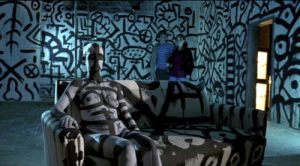In Goodbye Lenin!, the Kerners’ crisis symbolizes the people of Germany’s struggle to balance remembering and retaining parts of their past with embracing their country’s present after the collapse of the Berlin Wall. In particular, the scene in the film in which Laura and Alex are fighting while Alex’s mother, Christiane, is celebrating her birthday in the adjoining room is valuable to one’s understanding of this theme of past vs. present because it underscores the power of walls as both physical and psychological barriers to change and reality. Like the Berlin Wall that separated East Germany from the progress and influence of the outside world and enabled the government to have complete control, the four walls of Christiane’s bedroom also create an isolated reality because Christiane’s world is constituted solely by the actions and decisions made by her son. It is the ways in which these sets of walls, despite their differing scales and political purposes, are portrayed as having the ability to shift power, limit agency, and distort reality that connects the Kerner family to the history of Germany.
The staging and production of this argument scene highlights Laura and Alex’s differing views regarding the incorporation of the past and how reality can and should be constructed. As a whole, almost all of the visual focus is placed on Laura. Laura’s facial expressions are directly captured on screen and are portrayed through both her direct eye contact with the camera and her reflection in a mirror. This staging choice not only captures the severity of Laura’s disgust at the situation by illuminating her emotions and reactions, but also touches on her individual viewpoints regarding the past. In the same way that Laura looks at the Kerner’s unchanged house through the mirror, Laura is willing to reflect on her past and her existence as a former member of a communist nation, but is unwilling to accept the recreation of the past that has been created by Alex within his mother’s mind and bedroom. Laura is shown aggressively leaving Christiane’s room and shedding her old, eastern German clothes as if she is attempting to rid herself of her past identity and the discomfort that she feels on account of her and Christiane having their existences be altered and restricted in the Kerner’s house as if they are still members of a communist East Germany.
Conversely, the way in which Alex is portrayed in this scene highlights his dedication to the containment of the false reality within his home. Even though Alex is a central figure within this scene and dialogue, his face is almost always turned away from the camera. This staging suggests that Alex is not ready to confront the present time period within his country and actively decides to turn his back on the events taking place outside of his mother’s room. This decision to portray Laura directly and Alex indirectly is also significant because it reveals the psychological wall that has come between the couple on account of both the physical Berlin Wall ceasing to exist and the four walls that contain Christiane’s reality. Because Alex is committed to his created reality, he is constantly lying and creating deceptions, ultimately causing him to be slowly and mentally severed from the outside world, Laura, and his past self that was committed to the fall of the communist party. It is this disconnect between the couple that is embodied in their unparalleled portrayals within this scene.
One of the other dominating features in this scene is the way in which Laura and Alex’s fight is shown alongside the celebration contained within Christiane’s bedroom. Relegated to her room, Christiane is depicted as being a separate entity from that of her party guests and the argument between her son and Laura. Unlike her friends who are singing and celebrating, Christiane is only shown on screen as being quiet and alone, as if her bed serves as a wall between herself and other people. It is this decision to show Christiane as being disconnected from those in her room and from Alex and Laura that embodies her separation from the reality beyond her walls, as well as her isolation and loss of personal agency even in her own home. Like the people of East Germany who were trapped within the Berlin Wall and, consequently, lacked the power or the ability to explore life beyond their enclosure, Christiane is also mentally and physically trapped, leaving her alone in a past that no longer exists.




